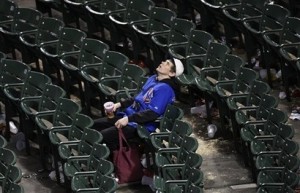A few college-football-themed blogs celebrated a minor holiday recently. Wednesday, May 23rd, marked 100 days until the 2012 college football season kicks off.
Understandably, in the estimation of sites like EveryDayShouldBeSaturday.com and its ilk this was a momentous occasion. For the madly faithful, like the men who run those sites, such a date is akin to the solstice celebrations of early civilizations around the world. It marked a moment of passage and equanimity, wherein the previous year’s toil and effort was handed off to memory and the anticipation for what lay ahead could begin in earnest.
Being a die-hard college football partisan (Go Blue!), I must say that I understood this celebration entirely too well. I have a way of viewing summer holidays not as celebrations of leisure and nature’s fertility, but as the stepping stones towards that marvelous autumn festival of pads and pageantry that is football season. Memorial Day is around the time that the season preview magazines are released, the 4th of July means I can start talking about it with friends, and the dog days of summer in late July and early August are when training camps open and I can devote myself wholeheartedly to reading tweets about the progress of this senior wide receiver or that incoming freshman at linebacker.
Summer is, of course, packed with all the excitement of sporting the Major League Baseball season. Why not put off my football obsession until pads are actually being put on? My answer: baseball is boring as fuck and increasingly irrelevant to American life. These are bold words, and I expect a rebuttal from at least one of my colleagues on the Addison Recorder, but I stand by them.
When my favored NBA and NHL teams are eliminated from the playoffs in May or June, I know that it is time to drop out of sports and find other things to care about. The sports world keeps spinning, of course; ESPN must talk about something I suppose, but none of it interests me for more than a few seconds. Sadly, summer is just one long slog until that first Thursday night in September when cleat meets leather under glaring lights. When I see that ball take flight and trace its arc down into the waiting arms of some spry return man the world is whole again. Until then, well, I am in a book club, so I suppose I should get going on that.
All that being said, I recognize that I need to back up all this talk with something like proof. Or at least a well-founded reason for my opinion. So here goes a defense of my heresy.
Baseball is, of course, America’s supposed pastime, the sport that Ken Burns immortalized as most beautifully representing our nation’s democracy, that glorious exhibition of… some other sentiment that sounds like Bill Taft dreamed it up between pot roasts. I don’t get it, and frankly, I never have.
The aforementioned EDSBS’s Orson Swindle has a habit of calling baseball a relic from the nineteenth century, an antiquated game from a slower time, which sounds about right to me. It’s the rare (perhaps only?) game where the offense is entirely reliant upon the hand-eye coordination of one person at a time and the defense can spend 7/8ths of their day not doing a damn thing but watching. As someone who spent a fair amount of time digging at turf with his cleats during Little League games, I can assure you the view from right field is no more exciting than that from the stands. The pace is glacial, the season exhaustingly long, and the uniforms strangely ungainly.
Down at its very core, baseball lacks that essential sense of drama that gives other sports their appeal. There is no sense of urgency or motion to an individual baseball game, nor the season in general. It is languid, taken to long stretches of in-action as pitchers warm up, batters strike out, and fat managers are forced to sweat it out in the uniform some unfortunate batboy has stuffed them into. Such a format makes sense when you consider that the game was developed by country folk who could not afford to expend every bit of their energy or essence in sport. If they wished to have a harvest and put food on the table then they could not afford to exhaust themselves with something more active.
This is all very understandable to me, and I would be a liar if I said that there had never been a lazy summer afternoon when a game of baseball sounded like a right good time. What eludes me is why this passive hobby is still considered a major sport worth investing time or interest in, when the modern world (and other sports) moves at such a wickedly fast pace.
It is not as if such breaks are unheard of in other prominent sports, of course. This article from a few years back found that the average three-hour football broadcast had eleven minutes of live game action. A similar study found that baseball games had 14 minutes of gameplay, so the two would seem fairly analogous. However, football makes up for its slow pace and limited action by imbuing every moment with mercilessly high stakes. If a wide receiver drops a single pass it can be the difference between a win and a loss (see this past year’s Super Bowl and Wes Welker’s inexplicable drop on the Patriots’ penultimate drive).
Such a misplay can cost a football team the game, and it has the potential to derail their entire season (and their fan base’s collective emotional well-being). By contrast, if a shortstop bobbles the ball and can’t make the throw to first in time he may get an error, but only in the last five weeks of the season could such a mistake immediately seem to haunt the team. If that baseball team loses said game, well… they can lose another sixty and still be a miraculously good outfit. It’s only when baseball reaches the late-season push or a playoff spot that there is any sense of drama to individual games.
Yes, there is always drama in those pressure-cooker situations as the season ends, but that’s true of every sport. Baseball fans going crazy over wildcard races in September is no different from NHL fans going nuts over Stanley Cup playoff berths in April. No one is arguing that the latter holds America’s popular consciousness in its grip anymore than other sports, and I truly think that the same is true of baseball. It is simply another sport, and the filler on the schedule at that. Baseball may once have been America’s pastime, and maybe when it was our country was a better place. I love me some Westerns and myths of Americana, so maybe if I ever get around to watching the aforementioned Ken Burns series I will buy that yarn. However, a simple glance at the viewership numbers for the average NFL game and the average MLB playoff game will lay bare that such a time is long past.
We live in the NFL’s world now. It is a monetized domain of corporate logos and vacuous talking heads, to be sure, but isn’t that exact what every other corner of contemporary society looks like? It’s hard to argue against reality, and the reality is that football is the United States’ pastime. Baseball is simply past its time.
Perhaps that is the point of baseball though. Its hopelessly boring nature makes it a great excuse to get outside. Instead of sitting in front of the TV watching a baseball game, we can go to the park and enjoy a lovely walk. Instead of spending untold hours watching a team shrivel into mediocrity we can go camping, experiencing firsthand the glories of nature and its infinitely sharper sense of competition. If this is the case, then, bravo. Summer is a splendid time of year, holding untold possibilities for fun and camaraderie. It’s just that none of that is provided by watching baseball.







